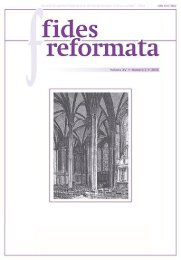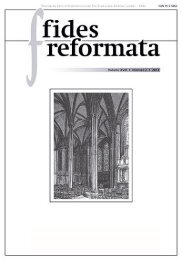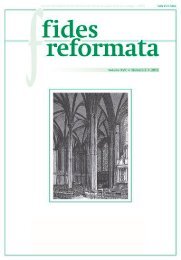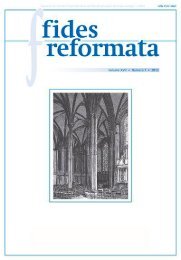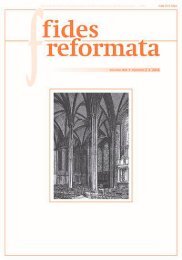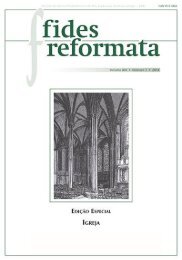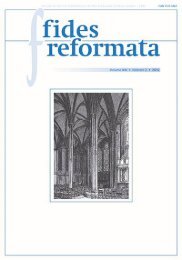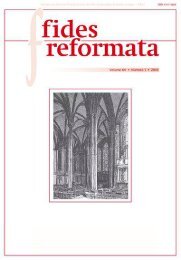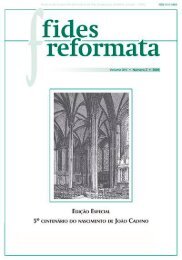You also want an ePaper? Increase the reach of your titles
YUMPU automatically turns print PDFs into web optimized ePapers that Google loves.
FIDES REFORMATA XX, Nº 1 (<strong>20</strong>15): 89-105<br />
And in what did Abraham had faith? In the fulfillment of the words of the<br />
covenant, Calvin affirms. God bound himself by promise to bless Abraham<br />
and all the nations by means of a seed which would come from him. The<br />
object of Abraham’s faith is in the promise of the covenant. This seed <strong>do</strong>es<br />
not represent Abram descendancy as a whole, but that particular blessed seed<br />
in which reconciliation would be achieved. 54 Veninga rightly summarizes the<br />
subject of justification and faith affirming that<br />
[...] the import of this discussion is that God freely called Abraham and offered<br />
to him and his posterity eternal salvation; Abraham was justified because he<br />
believed the Father, not because of personal merit. The clue to Abraham’s spiritual<br />
success is that he believed in the promise, and from this belief he gained<br />
courage for a life of obedience. 55<br />
The association of the Abrahamic covenant with circumcision and participation<br />
in the covenant is inevitable. In his comments on Genesis 17:7, Calvin<br />
insists that God’s covenant with Abraham is not only immediately with him alone<br />
but also includes his natural descendants. “There is no <strong>do</strong>ubt,” Calvin affirms,<br />
“that the Lord distinguishes the race of Abraham from the rest of the world.”<br />
By the expression “race of Abraham”, Calvin means those who are biologically<br />
related to Abraham: “Nothing is more certain, that God made his covenant with<br />
those sons of Abraham who were naturally to be born of him.” 56 Nevertheless,<br />
Abraham’s descendants are not to be differentiated from the Church; in fact, Israel<br />
is the Old Testament Church in the body of a nation separated from all others.<br />
In the beginning, antecedently to this covenant, the condition of the whole world<br />
was one and the same. But as soon as it was said, “I will be a God to thee and<br />
to thy seed after thee,” the Church was separated from other nations; just as in<br />
the creation of the world, the light emerged out of the darkness. 57<br />
<strong>do</strong>es not justify us for any other reason, than that is reconciles us unto God; and that it <strong>do</strong>es so, not by its<br />
own merit; but because we receive the face offered to us in the promises, and have no <strong>do</strong>ubt of eternal<br />
life, being fully persuaded that we are loved by God as sons.” Calvin, Commentaries on Genesis, 1:407.<br />
54 “It seems, however, to be absurd, that Abram should be justified by believing that his seed would<br />
be as numerous as the stars of heaven; for this could be nothing but a particular faith, which would but<br />
no means suffice for the complete righteousness of man. Besides, what could an earthly and temporal<br />
promise avail for eternal salvation? I answer, first, the believing of which Moses speaks, is not to be<br />
restricted to a single clause of the promise here referred to, but embraces the whole; secondly, Abram did<br />
not form his estimate of the promised seed from this oracle alone, but also from others, where a special<br />
benediction is added. Whence we infer that he did not expect some common or undefined seed, but that<br />
in which the world was to be blessed.” Calvin, Commentaries on Genesis, 1:406.<br />
55 James Frank Veninga, “Covenant Theology and Ethics in the Thought of John Calvin and John<br />
Preston” (PhD diss., Houston, TX: Rice University, 1980), 49.<br />
56 Calvin, Commentaries on Genesis, 1:447-448.<br />
57 Ibid., 1:448.<br />
101





